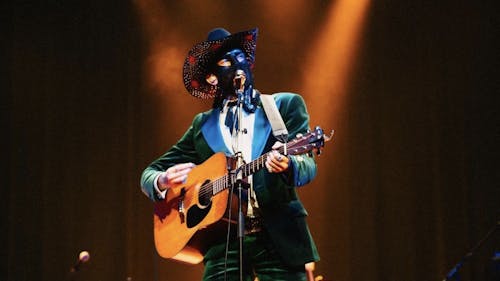New Town Road: How country music's new hitmakers bring diversity to their genre

Quick, think of a country song. Maybe it's Johnny Cash, Willie Nelson or Dolly Parton. Or maybe it's something by Morgan Wallen or Luke Combs. Throughout the years, country music has evolved from "bluegrass" to "honky-tonk" to a modernized genre that brings in the influences of country and, well, everything else.
While still popular, country music struggles in its battles on the music charts, competing against the more popular pop and rap beats of today. But conversely, that's exactly what some country artists are doing to stick out a little more within the country genre — they're using influences from other music styles.
Country music has a reputation of being geared toward conservative values, and there have been multiple scandals involving country singers being exposed for their racism and conservative political views.
Orville Peck has changed that narrative. The openly gay singer has introduced music with a country influence to the queer community and has allowed for more visibility among the queer fans of country music.
Peck is known both for his fringe mask which shields his face and for giving queer people a visible place in the country music sector. He has a background in playing the drums, and his music reflects this punk-influenced tone.
In an interview with NPR, Peck said he chooses to write country music because “it’s the genre of storytelling.” He likes the vulnerability he can have through music, and his mask allows that too. To him, country music is more than “straight white men singing about trucks” but rather, telling raw stories.
His song “Dead of Night” became widely popular when it was used in "Euphoria" season two. The track has rock and classical influences but with a western, country tone and lyrical component. This is all evident as Peck sings, “Stark, hollow town, Carson city lights/Baby, let's get high/Spend a Johnny's cash, hitch another ride.”
Kacey Musgraves is another artist who's changing country music. The six-time Grammy winner is one of the biggest country stars today. She's turned a little more pop now, but her music still has roots in the country music genre, even in her most famous album "Golden Hour." She writes about her life, her relationships and breakups.
One of Musgraves' first singles, “Follow Your Arrow” is a great example of how Musgraves made an impact in country music. The song alludes to marriage, divorce, mental health, same-sex relationships and drugs, all things that stray from the truck, beers and country pride many people associate with this genre.
The song got praise from many, but it was banned on several country music stations, proving just how much artists who step outside the box are truly trailblazing in the country music genre.
Musgraves does not identify as queer, but she has been an ally for years and has songs that the LGBTQ+ community regards as pride anthems. For her, country music is not political or limited to the heteronormative, white, Southern stereotype.
Musgraves told People Magazine that “one of the biggest compliments … that I've ever gotten in my career was a gay country fan saying, ‘You know what, you have made me feel like I’m finally invited to a party that I’ve never been invited to.’” Musgraves continues to fight for the LGBTQ+ community in the media — and in life — through her music and her platform.
While the genre of country has historically been influenced by Black pioneers of music, the genre's conservative shift has also made it more white, but artists like Jimmie Allen are changing that today.
After getting his start on American Idol, Allen won New Male Artist of the Year in 2021. He's also touched upon racism in the industry: When Wallen got into a scandal after a video of him using a racial slur went viral, Allen said he discussed the incident with Wallen and his own personal issues.
The “Best Shot” singer preaches accountability and representation in the country music genre. The unreleased song “Untitled Song” was teased on Allen's Instagram and is about his struggle with mental illness.
He wants his fans and people to know that everyone struggles and sent a message to his fans in the caption of his post: “you’re not alone and it’s ok to say you’re not ok.”
While he's made no other country music so far, Lil Nas X is also another Black, queer artist who got his big break in the country-rap hit “Old Town Road,” which started a lot of controversy over its classification as a country song during its release.
Country music is not all dirt roads and boots with spikes. Some of it is — but it's not a bad thing to like country music. Regardless of whether you like that kind of music, it's still nice to see the genre adapting to a more inclusive audience.



